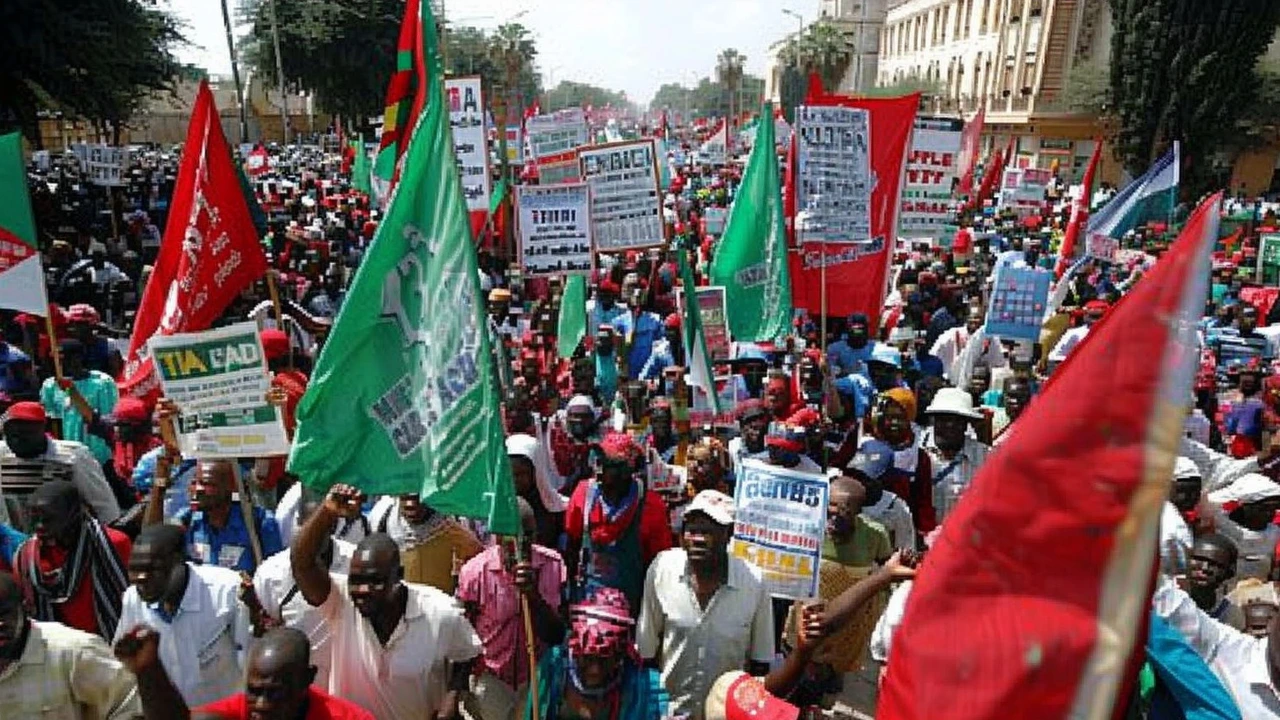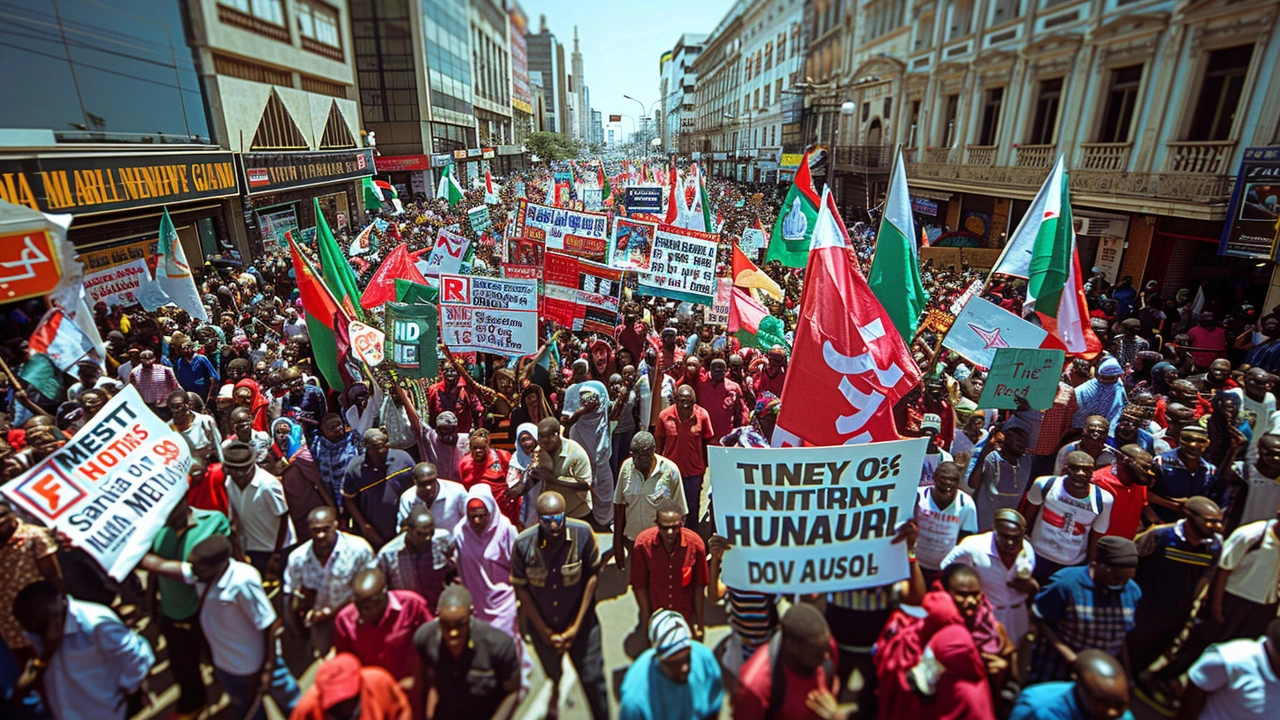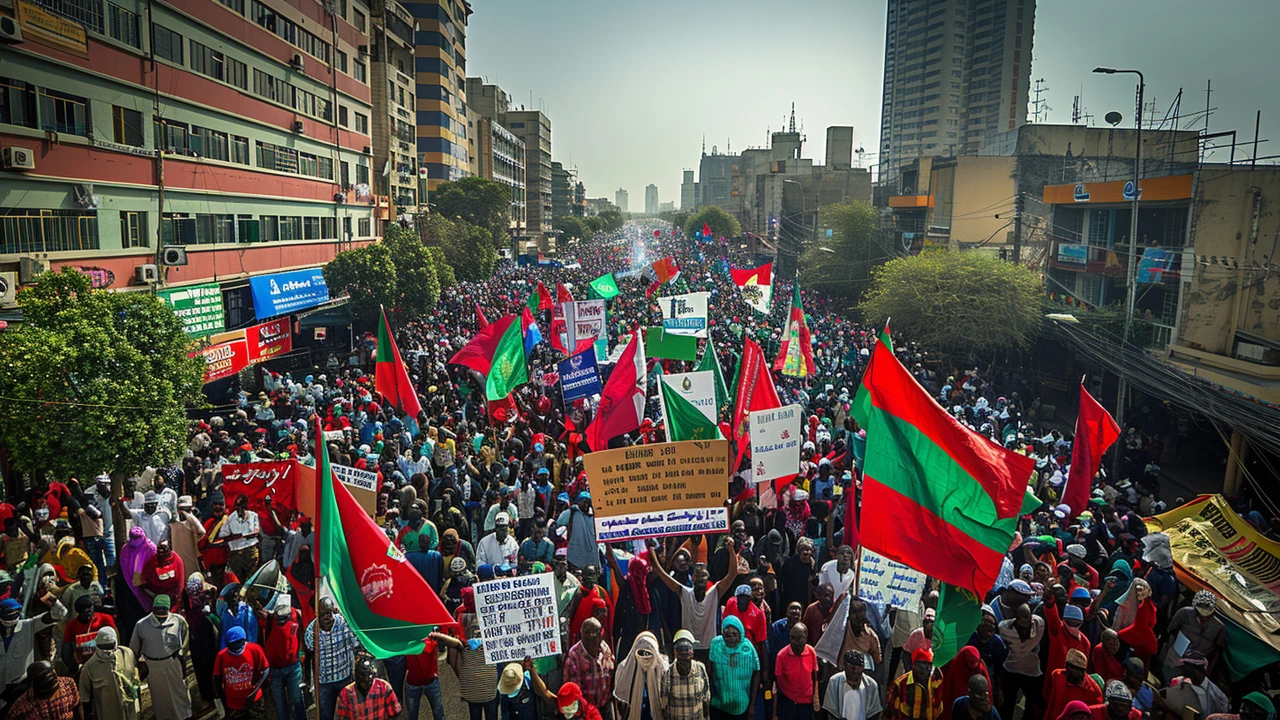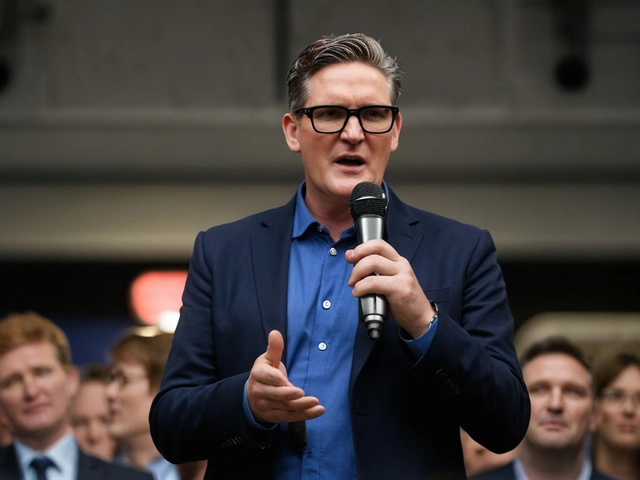Nigeria Labour Congress and Trade Union Congress Unite for Workers' Rights
The Nigeria Labour Congress (NLC) and the Trade Union Congress (TUC) have officially commenced an indefinite strike, aiming to force the government's hand on two major issues: a significant minimum wage increase and the reversal of a controversial electricity tariff hike. The strike, which started on June 3rd, follows a long-standing standoff between the labour unions and the federal government that has left thousands of workers in uncertainty.
The roots of this conflict lie in the Nigerian government's refusal to meet the demands of labour unions for a new minimum wage. The unions, representing millions of workers across various sectors, have been pushing for a minimum wage adjustment from N60,000 to a substantial N615,500. This demand comes in response to the escalating cost of living in Nigeria, putting immense pressure on ordinary workers who are struggling to make ends meet.
High Cost of Living and Unyielding Government
The government's counterproposal included incremental wage increases of N48,000, N54,000, and N60,000, which the unions outrightly rejected. Labour leaders argue that these figures are insufficient to cope with the ever-rising prices of basic commodities, housing, transportation, and healthcare. The refusal to accept the government's offer highlights a wider issue of income inequality and insufficient economic policies addressing the needs of the working class.
Adding fuel to the fire, the National Electricity Regulatory Commission (NERC) recently approved an increase in electricity tariffs, affecting customers particularly classified under Band A. The new tariff, soaring from N66 to a staggering N225 per kilowatt-hour, has drawn sharp criticism from labour unions and the general public. The latest hike has stretched household budgets thinner, making any additional financial burdens unacceptable to already struggling Nigerians.

An Ultimatum Ignored
Before resorting to strike action, the labour unions had presented an ultimatum to the NERC and the federal government, demanding that the recent electricity tariff hike be reversed by May 31. Regrettably, this deadline passed without any substantive response from the authorities. The lack of dialogue and action to address these pressing concerns forced the NLC and TUC to take the dramatic step of calling for an indefinite strike.
The ramifications of this strike are expected to be far-reaching, affecting various aspects of daily life, commerce, and public services in Nigeria. Industries are likely to face shutdowns, transportation disruptions are anticipated, and the healthcare sector may find itself operating with a skeleton crew. The ultimate goal of this industrial action is to compel the government to engage in genuine and earnest negotiations to resolve these critical issues.
Solidarity Across Sectors
To ensure the success of the strike, the labour unions have not only relied on their members but also extended their call to action to affiliates, state councils, civil society organizations, market vendors, and the general public. This unified front showcases the deep-seated frustration and the shared resolve to see meaningful changes implemented. The decision to strike was not made lightly, but it underscores the prevailing sentiment that the government has continuously ignored the plight of the working class.
The strike action is a desperate attempt by the unions to capture the government's attention and bring about long-overdue economic reforms. The labour unions stress that this is not just about securing wage increments but ensuring a sustainable and livable income for all workers, which they argue is foundational for national stability and economic progress.

Broader Socio-Economic Implications
As the strike unfolds, there will be numerous questions about its long-term impact on Nigeria's economy and societal structure. Economists warn that prolonged industrial action could result in significant output losses, decline in foreign investments, and a potential backlash in investor confidence. Conversely, successful negotiations could pave the way for more balanced economic policies and improved labour relations in the future.
While the NLC and TUC continue to champion the cause of the workers, there is a need for all stakeholders to come to the negotiating table with a spirit of compromise and collaboration. The resolution of this strike will require innovative approaches to wage determination, as well as policies addressing broader economic challenges such as inflation, unemployment, and social welfare.
The Road Ahead
The indefinite strike signifies a pivotal moment in Nigeria's socio-political landscape. As the NLC and TUC stand firm in their demands, the federal government faces a crucial decision: heed the calls for a fair and livable minimum wage and address the grievances surrounding the electricity tariff hike, or risk prolonged unrest and economic instability.
Workers across the nation are looking towards their leaders for decisive action. It remains to be seen whether the government will rise to the occasion or if Nigeria will witness an intensification of labour disputes. What is clear, however, is the unwavering solidarity among the Nigerian workforce, united in their pursuit of a better and equitable future.







Lemuel Belleza
June 1, 2024 AT 19:33 PMThe strike just shows how clueless the government is about real economics.
Subhash Choudhary
June 20, 2024 AT 03:49 AMMan, I’ve seen strikes before, but this one feels different.
The wage gap in Nigeria is insane, and the electricity price hike just pushes people over the edge.
It’s like the government keeps turning up the heat while the workers are left shivering.
Ethan Smith
July 8, 2024 AT 12:06 PMThe demands for a minimum wage increase from N60,000 to N615,500 reflect a substantial gap between current earnings and the cost of living.
Likewise, the electricity tariff escalation to N225 per kilowatt‑hour imposes a severe burden on households.
It is essential that both parties engage in constructive dialogue to reach a sustainable solution.
faye ambit
July 26, 2024 AT 20:23 PMWhile the government’s approach may appear detached, it is important to consider the broader systemic challenges they face.
Constructive engagement, rather than outright condemnation, could pave the way for mutually beneficial reforms.
Solidarity among workers remains a vital catalyst for change.
Evelyn Monroig
August 14, 2024 AT 04:39 AMThe so‑called strike is nothing more than a front for a hidden agenda orchestrated by foreign interests.
These powers have long used labour unrest to destabilize nations that refuse to bow to their economic dictates.
Behind the scenes, shadowy financiers are pulling the strings, ensuring that Nigeria remains beholden to their energy monopolies.
The sudden push for a wage hike is a calculated move to inflate the labor market and make the country more vulnerable to debt traps.
Simultaneously, the electricity tariff increase is designed to funnel profit to multinational corporations that control the grid.
The government, blinded by these puppeteers, pretends to negotiate while actually serving external masters.
Public protests are merely a smokescreen to distract from the deeper erosion of sovereignty occurring daily.
Media outlets, complicit in the narrative, downplay the true motives and present the strike as a simple domestic dispute.
What the populace fails to see is the coordinated effort to weaken the middle class, making it easier to implement authoritarian policies.
Every concession the unions demand will be twisted into a lever for foreign leverage.
The NERC’s decision on tariffs was pre‑approved in secret meetings that never saw the light of public scrutiny.
These clandestine agreements ensure that electricity revenues flow into offshore accounts tied to elite global networks.
If the workers continue down this path, they will inadvertently hand over more control to those very entities.
The only way forward is to expose these machinations and reject any compromise that benefits the hidden elite.
True emancipation comes from dismantling the entire structure that allows such manipulation to persist.
Until the people recognize the depth of this conspiracy, any strike will merely serve the interests of those pulling the strings.
Gerald Hornsby
September 1, 2024 AT 12:56 PMThe nation trembles under the weight of greed, and we watch it crumble. 😔
Hina Tiwari
September 19, 2024 AT 19:33 PMI feel you, Gerald-this situation hits deep, and it’s heartbreaking to ssee.
We must stay hopeful and support each other, even when the odds seem stacked.